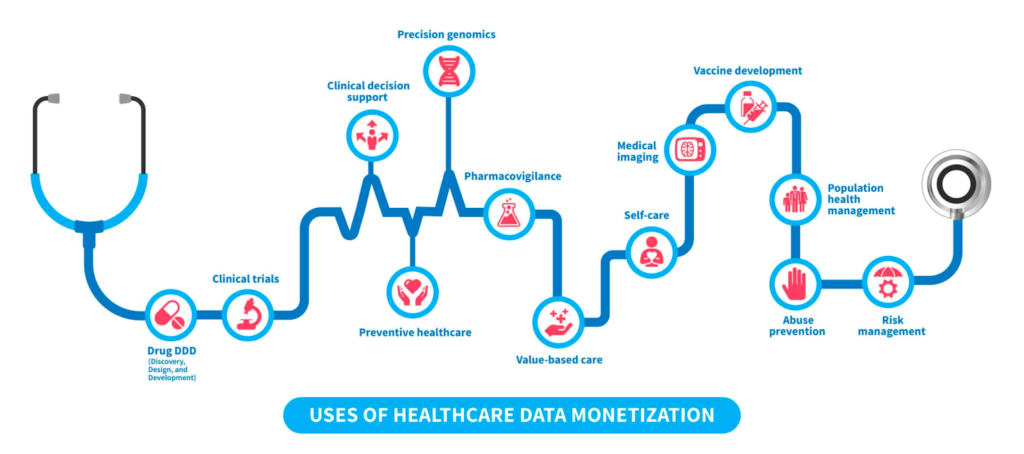Data monetization is the process of generating revenue from the use of data for various purposes. This involves collecting, analyzing, and selling data to businesses or other organizations for marketing, advertising, research, and other purposes. Data monetization can take many forms, including selling data to third-party vendors, licensing data to other businesses, or using data to develop new products and services.
Data can be monetized in various industries, such as healthcare, finance, and retail, among others. It is important to note that data monetization should be done in compliance with relevant data privacy laws and ethics to ensure that data is used appropriately in accordance with the consent of those whose data is being used. In this article, we will discuss data monetization in the healthcare industry, specifically pharmaceutical companies.

Why Data Monetization is Important for Pharmaceutical Companies
Data monetization is important for pharmaceutical companies because it allows them to use the data that they collect throughout their drug development process to generate revenue. Due to the competition in the pharmaceutical industry, companies need to constantly invest in research and product development to stay on top of the market and create new drugs, treatments, and findings. By using data monetization, pharmaceutical companies can not only recoup the expenses needed for drug development, but they can also create new streams of revenue through partnerships with other companies and projects. Some examples of this include: licensing data to other companies, selling data to researchers or clinicians for clinical trials and testing, or creating new products/services based on the current data. Moreover, data monetization can help pharmaceutical companies gain insights into patient behavior, treatment outcomes, and disease patterns, which can lead to better future drug development efforts and more effective treatments. It can also allow companies to benefit in an economic aspect as they can develop targeted marketing campaigns to improve sales and distribution patterns.

Pharmaceutical companies that produce medicine and supplements can monetize their data in several ways that help them generate greater revenue and increase efficient decision-making.
Selling Data to Researchers
Companies can sell their data to researchers that conduct studies on the safety and efficiency of certain drugs and supplements. This data can be used by researchers to conduct clinical trials and studies to generate insights and new findings about the effectiveness of different healthcare treatments.
Partnering with Health Insurance Companies
Pharmaceutical companies can form partnerships with health insurance companies and provide patient data on the effects of various drugs or supplements. Health insurance companies can use this data to make economic decisions such as coverage and reimbursement for treatments.
Developing Predictive Models
Companies can use their data to create predictive models that help identify early symptoms and diagnoses for patients who are at risk for certain diseases. This information can be used to provide targeted interventions, improve patient outcomes, and introduce preventative measures.
Licensing Data to other Companies
Companies can license their data to other healthcare companies, such as pharmaceutical companies or medical device manufacturers. These companies can use the data for their own product development or research purposes.
With data monetization, pharmaceutical companies can benefit in many ways, such as by generating additional revenue, improving patient outcomes, and increasing better decision-making. However, it is vital to maintain ethics while monetizing data to protect patient information and confidentiality.
The Importance of Ethics in Data Monetization
Pharmaceutical companies can monetize their data to generate more revenue and increase customer satisfaction. However, it is vital to maintain ethics and follow privacy laws during this process. Pharmaceutical companies can ethically monetize their data by following certain principles and guidelines that prioritize the protection of patient privacy and the responsible use of data. Some ways pharmaceutical companies can ethically monetize their data are:
Obtain Informed Consent
Pharmaceutical companies should obtain consent from patients before collecting and using their data. Informed consent means that patients are fully aware of how their data will be collected, used, and shared and have full permission to opt out of their data being used.
Anonymize Data
Pharmaceutical companies should also anonymize patient data before selling and using it to ensure patient privacy and confidentiality. Anonymization specifically refers to removing personally identifiable information from the data. This includes names, addresses, social security numbers, and more. This makes it harder for the data’s owners to be identified and protects the identity of patients.
Adhere to Data Security and Privacy Regulations
Pharmaceutical companies should adhere to data security and privacy regulations. In the United States, the healthcare privacy regulation law is HIPAA. There are also other local regulations that must be followed to protect patients’ data from being used in an unauthorized way.
Establish Ethical Guidelines for Data Use
Pharmaceutical companies should establish ethical guidelines for data use, which should include transparency in data collection and use, responsible stewardship, and a commitment to using data to benefit patients and society and not solely for monetary and marketing purposes.

Conclusion
Overall, data monetization is an important strategy for pharmaceutical companies to stay competitive, recoup costs, and generate greater revenue while also advancing the development of new treatments and improving patient outcomes.
Sources

